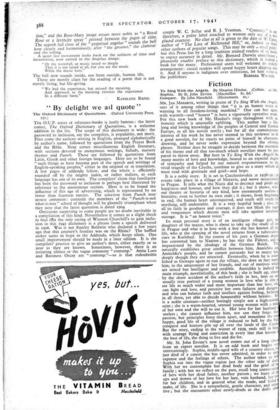" By delight we ail quote "
THE O.U.P. senes of reference-books is justly famous: the latest comer, The Oxford Dictionary of Quotations, is a welcoMe addition to the list. The scope of this dictionary is wide: the password to inclusion, say the compilers, is popularity, not merit. First come the authors writing in English, arranged alphabetically by author's name, followed by quotations from the Prayer Book and the Bible. Next comes miscellaneous English literature, with sections devoted to anonymous writings, ballads, nursery rhymes and Punch. • These are followed by quotations from Latin, Greek and other foreign languages. Here are to be found " such things as have become part of the speech and writings of English-speaking peoples," either in the original or in translation. A few pages of addenda follow, and the whole i efficiently rounded off by the mighty index, or rather indices, as each language has one of its own. The compilers' claim that familiarity • has been the password to inclusion is perhaps best illustrated by reference to the anonymous section. Here is to be found the influence of this age of advertising, which is represented by no fewer than fourteen entries. The selection from Punch may arouse comment : certainly the members of the " Punch-is-not what-it-was " school of thought will be gloomily triumphant when they note that the latest quotation is dated 1904.
Omissions surprising to some people are no doubt inevitable in a compilation of this kind. Nevertheless it comes as a slight shock to find tHat the only saying of Winston Churchill's to gain inclu- sion in this 1941 dictionary is a phrase from a speech delivered in 1906. Was it not Stanley Baldwin who declared a few years ago that this country's frontier was on the Rhine? The baffled seeker turns in hope to the Addenda, which keeps silent. One small improvement should be made in a later edition. It is the compilers' practice to give an author's dates, either exactly or as near as they are known. Sometimes, however, there is an irritating silence or the vague comment " contemp." Anita Loos and Baroness Orczy are " contemp."—so is that redoubtable
couple W. C. Sellar and R. J. Yeatman. " Contemp." is not therefore, a polite label attached to women only out of a !pi. placed courtesy. No clue at all is given to the date of W. Upt,,„ author of "The Lass of Richmond Hill," or, indeed, to n1;3 other authors of popular songs. This may be only el small point: but this Press has by a long tradition trained readers of its boots to expect accuracy in detail. Mr. Bernard Darwin contributes a pleasantly erudite preface to this dictionary, which is indeed a book for the many. Professional users will welcome its orderly arrangement : casual readers will spend happy hours dipping into it. And if anyone is indignant over omissionsit,RBARAlet himwA write to


























 Previous page
Previous page